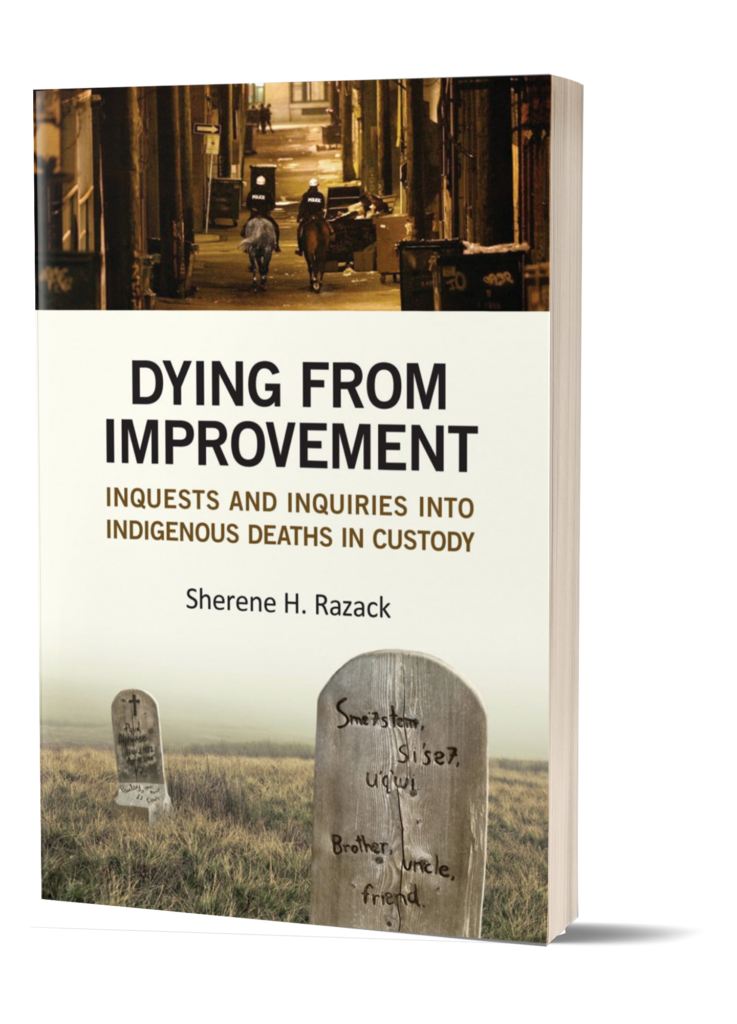- Home
- Publications
Dying from Improvement: Inquests and Inquiries into Indigenous Deaths in Custody
Published May 2015
Dying from Improvement: Inquests and Inquiries into Indigenous Deaths in Custody
No matter where in Canada they occur, inquiries and inquests into untimely Indigenous deaths in state custody often tell the same story. Repeating details of fatty livers, mental illness, alcoholic belligerence, and a mysterious incapacity to cope with modern life, the legal proceedings declare that there are no villains here, only inevitable casualties of Indigenous life.
But what about a sixty-seven-year-old man who dies in a hospital in police custody with a large, visible, purple boot print on his chest? Or a barely conscious, alcoholic older man, dropped off by police in a dark alley on a cold Vancouver night? Or Saskatoon’s infamous and lethal starlight tours, whose victims were left on the outskirts of town in sub-zero temperatures? How do we account for the repeated failure to care evident in so many cases of Indigenous deaths in custody?
In Dying from Improvement, Sherene H. Razack argues that, amidst systematic state violence against Indigenous people, inquiries and inquests serve to obscure the violence of ongoing settler colonialism under the guise of benevolent concern. They tell settler society that it is caring, compassionate, and engaged in improving the lives of Indigenous people – even as the incarceration rate of Indigenous men and women increases and the number of those who die in custody rises.
Razack’s powerful critique of the Canadian settler state and its legal system speaks to many of today’s most pressing issues of social justice: the treatment of Indigenous people, the unparalleled authority of the police and the justice system, and their systematic inhumanity towards those whose lives they perceive as insignificant.

Praise
“Dying From Improvement is vivid and disturbing. Professor Razack draws readers with an electric narrative and police reporter’s eye for detail.”
Holy Doan, Blacklock’s Reporter
“This is a passionate, thought-provoking, and disconcerting book… A milestone in the study of deaths of Aboriginal people in Canada.”
Liqun Cao, The Canadian Journal of Native Studies, vol 35:02:2015
“While Razack does not offer explicit remedies for the crisis in accountability of the Canadian police forces, the importance of this book lies in its use as a critical tool in locating colonialism in the modern Canadian narrative, especially in the upcoming inquiry into murdered and missing indigenous women. DYING FROM IMPROVEMENT is an important read for all those who will be paying close attention to the process as it unfolds, and a call-to-arms to ensure that its outcomes, conclusions and remedies are, indeed, just.”
Kimberly Wilson, Canadian Dimension, Volume 50, No2, Spring 2016
“This a difficult but important book to read. Razack balances her analysis of state violence with the agency of Indigenous family members, but she deals with a topic few Canadians want to acknowledge.”
Lianne C. Leddy, Herizons, Fall 2016| Vol 30 No.2
“Razack’s arguments are provocative. She has constructed a compelling and disturbing analysis which will challenge readers at many levels… It is impossible not to be moved by the evidence and analysis, and what these say about contemporary Indigenous life and death in Canada.”
Jane Dickson, Criminal Law & Criminal Justice Reviews
“Dying from Improvement is a courageous, confrontational analysis into the roots of indigenous injustice and deaths.”
Megan Siu, Canadian Law Library Review vol 41:04:2016
“Dying from Improvement makes a compelling argument that colonialism is not a thing of the past, but is real and ever present. Razack’s analysis illustrates the normalization of the dehumanization of Indigenous people, while offering a meticulous, thoughtful, and sensitive defense of the humanity of those affected.”
Verna St Denis, Department of Educational Foundations, University of Saskatchewan
“This is sociology at its finest, theorized and argued in a robust, relentlessly accessible, and yet sophisticated way. Dying from Improvement is a major contribution to the issues of Indigenous disposability, suffering, and struggles for justice within a settler state that is dedicated to their disappearance.”
Audra Simpson, Department of Anthropology, Columbia University
“Dying for Improvement makes an important argument with implications for every Canadian’s grasp of colonialism, capitalism, oppression, and privilege.”
Joyce Green, Department of Politics and International Studies, University of Regina